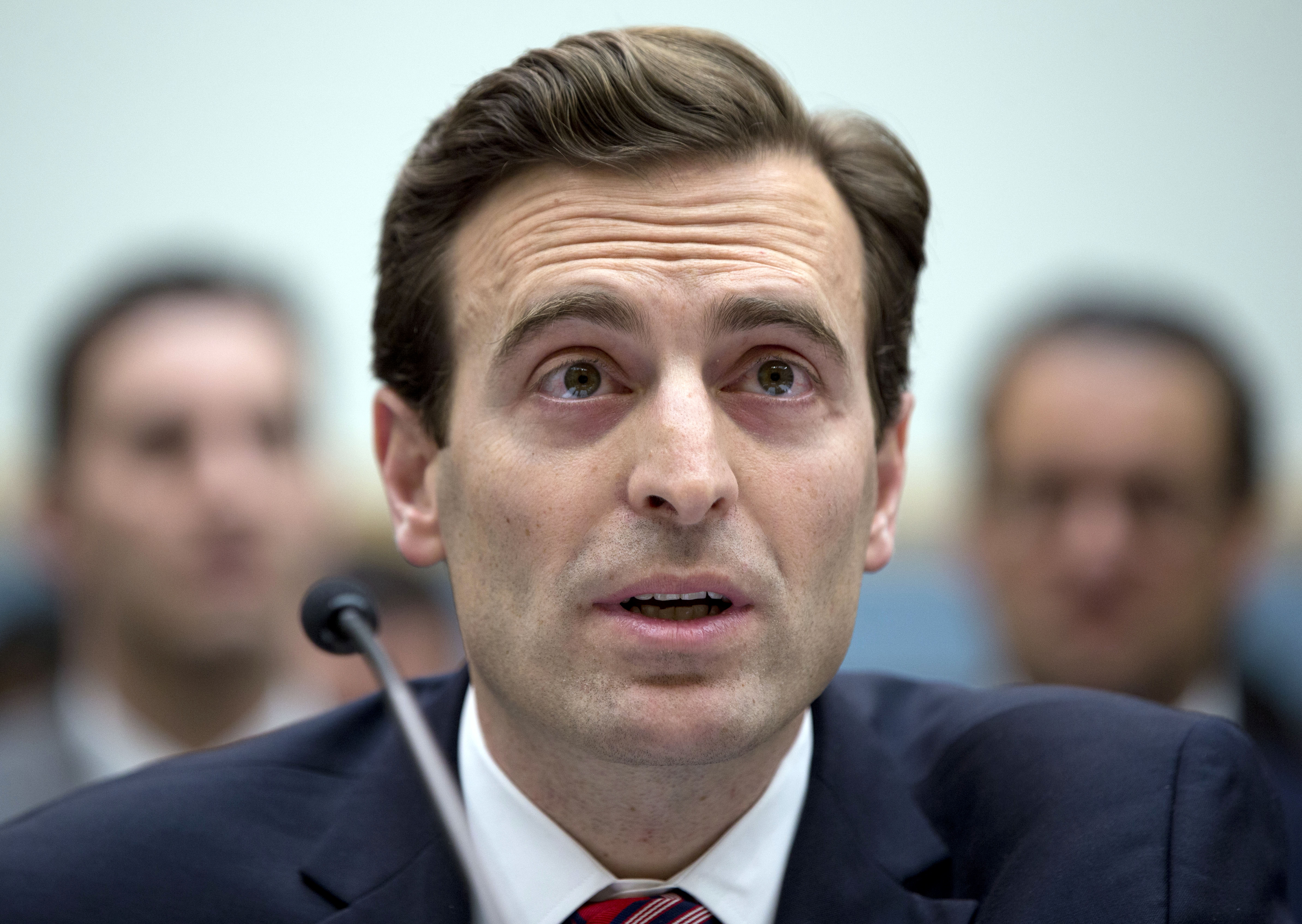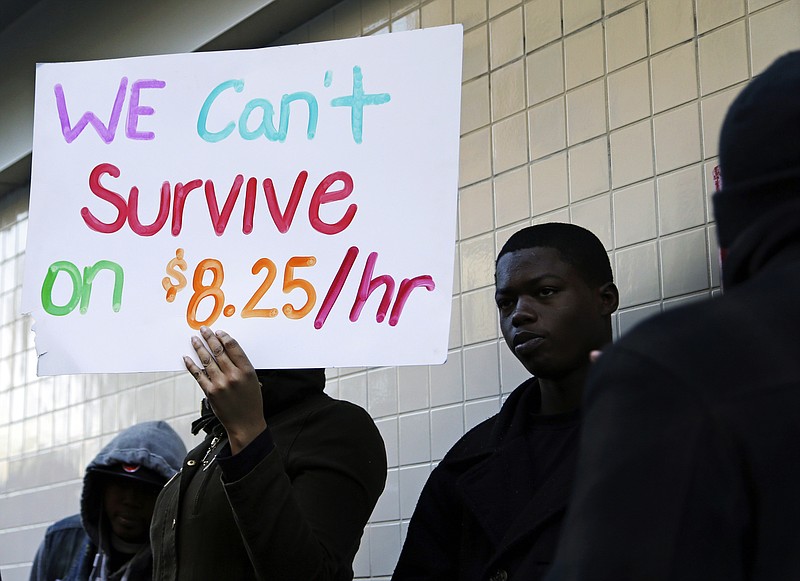 FILE - In this Feb. 25, 2015 file photo, Nevada Attorney General Adam Laxalt testifies before the House Judiciary committee on Capitol Hill in Washington. A federal court on Tuesday, Nov. 22, 2016, blocked implementation of a rule imposed by President Barack Obama's administration that would have made an estimated 4 million more higher-earning workers across the country eligible for overtime pay starting Dec. 1. (AP Photo/Carolyn Kaster, File)
FILE - In this Feb. 25, 2015 file photo, Nevada Attorney General Adam Laxalt testifies before the House Judiciary committee on Capitol Hill in Washington. A federal court on Tuesday, Nov. 22, 2016, blocked implementation of a rule imposed by President Barack Obama's administration that would have made an estimated 4 million more higher-earning workers across the country eligible for overtime pay starting Dec. 1. (AP Photo/Carolyn Kaster, File)In a blow to the Obama administration's labor-law plans, a federal court has blocked the start of a rule that would have made an estimated 4 million more American workers eligible for overtime pay heading into the holiday season.
As a result of the ruling, overtime changes set to take effect next week are now unlikely to be in play before vast power shifts to a Donald Trump administration, which has spoken out against Obama-backed government regulation and generally aligns with the business groups that stridently opposed the overtime rule.
The U.S. District Court in the Eastern District of Texas granted the nationwide preliminary injunction, saying the Department of Labor's rule exceeds the authority the agency was delegated by Congress.
"Businesses and state and local governments across the country can breathe a sigh of relief now that this rule has been halted," said Nevada Attorney General Adam Laxalt, who led the coalition of 21 states and governors fighting the rule and has been a frequent critic of what he characterized as Obama administration overreach. "Today's preliminary injunction reinforces the importance of the rule of law and constitutional government."
The regulation sought to shrink the so-called "white collar exemption" that allows employers to skip overtime pay for salaried administrative or professional workers who make more than about $23,660 per year. Critics say it's wrong that some retail and restaurant chains pay low-level managers as little as $25,000 a year and no overtime - even if they work 60 hours a week.
Under the rule, those workers would have been eligible for overtime pay as long as they made less than about $47,500 a year, and the threshold would readjust every three years to reflect changes in average wages.
The Department of Labor said the changes would restore teeth to the Fair Labor Standards Act, which it called "the crown jewel of worker protections in the United States." Inflation weakened the act: overtime protections applied to 62 percent of U.S. full-time salaried workers in 1975 but just 7 percent today.
The agency said it's now considering all its legal options.
"We strongly disagree with the decision by the court, which has the effect of delaying a fair day's pay for a long day's work for millions of hardworking Americans," the labor department said in a statement. "The department's overtime rule is the result of a comprehensive, inclusive rulemaking process, and we remain confident in the legality of all aspects of the rule."
The ruling dealt a major blow to the Obama administration's effort to beef up labor laws it said weren't keeping pace with the times.
Opponents fought hard against the rule, saying it would increase compliance costs for employers who would have to track hours more meticulously and would force companies to cut employees' base pay to compensate for overtime costs that kick in more frequently.
U.S. Sen. Lamar Alexander, R-Tenn., and chairman of the Senate labor committee, said the court ruling gives President-elect Trump and Congress an opportunity next year to revise the "destructive" overtime rule that "would have raised college tuition, cut nonprofit services and sent the nation's workers backward - demoting millions back to punching a time clock."
Alexander said many Tennessee businesses and nonprofits are "breathing a sigh of relief," although the 11th hour decision by the court just a few days before the Dec. 1 start of the overtime requirements means many employers had already put the new rules in force - or at least told workers they were raising their pay or putting them on the clock.
Alexander said prices would have had to be raised on some goods and services to pay for the overtime provisions. However, some employers sought to minimize the cost impact of the new rules by adjusting hourly wages to reflect similar pay to the past even with the new overtime requirements for time and a half pay after 40 hours.
"This is a massive victory for them and for the more than 1,200 individuals and organizations - from mental health treatment providers to Christmas tree farms -who wrote to me because they feared this rule's implementation on Dec. 1," Alexander said.
U.S. Sen. Bob Corker, R-Tenn., said the decision is "a huge victory for small businesses and the many Tennesseans who would have experienced reduced hours or layoffs under this rule."
"The Obama administration's unilateral actions made sweeping labor regulation changes without congressional input, and I am pleased a federal judge agreed that the Department of Labor overreached its authority," he said.
Karen Kerrigan, president and CEO of the Small Business and Entrepreneurship Council, said "the one-size-fits-all doubling of the salary threshold demonstrated ignorance regarding the vast differences in the cost-of-living across America."
The Retail Industry Leaders Association said DOL "overreached beyond their authority increasing the threshold too much, too fast."
The Department of Labor could appeal the ruling, which might end up at a Supreme Court that includes some Trump appointees.
But the injunction takes political pressure off the incoming administration at an opportune time, according to labor law professor Ruben Garcia of UNLV's Boyd School of Law. With no new overtime changes kicking in Dec. 1, Trump can accept the status quo and won't have to risk angering workers by walking back overtime benefits shortly after employees start receiving them.
His administration could choose to make its own rule changes through the lengthy administrative process. Or Congress could amend labor laws.
The impending rule wasn't front and center in the presidential campaign, but Trump did tell the news site Circa in August that he would love to see a delay or carve-out for small businesses in the overtime regulation. Republican House Speaker Paul Ryan was more vocal against it, saying it would be an "absolute disaster" for the economy and was being rushed through by Obama to boost his political legacy.
